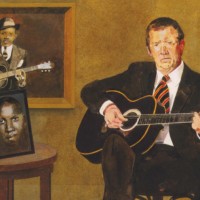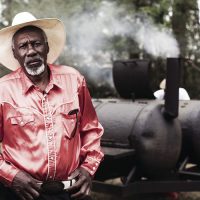by Nick DeRiso
An honorable, if ultimately somewhat superficial, tribute to the thing that makes Robert “Jr.” Lockwood such an important element to modern blues.
Lockwood was something of a stepson to Robert Johnson. The doomed Delta bluesman would stop in to stay with Lockwood’s mother in Helena, Ark., during early 1930s road trips along the chitlin’ circuit, and they became fast (if unlikely) friends.
Lockwood, it seems, had begun his own musical journey at the family pump organ — preferring, as a strong-headed late teen, to play an instrument that was less dependent on others. He was no accompanist.
Johnson, a dandified houseguest who fancied his mom, blew apart those notions. He was, after all, famously photographed not as a bedraggled roadhouse bandleader, but in the best haberdashery of the day. Those duds did more than a little to convince Lockwood of the magical opportunities for wealth out on the road, and Johnson’s spidery, tendril fingers helped the youngster to see the complex polyrhythms possible as a soloist.
Johnson taught him some of his now-legendary early compositions, even helped Lockwood construct a crude homemade guitar out of pieces of an old phonograph, using baling wire for frets. Eventually, they toured together, until Johnson’s untimely death (after precious few recorded tunes were captured) in 1938.
Lockwood became known as “Robert Jr.,” and carried forward the style, if not the murkier impulses associated with Johnson’s lifestyle, into the late 20th century. Lockwood’s tune “Take A Little Walk With Me” (from early 1940s sessions for Bluebird) is thought to be an adaptation of an earlier Johnson composition. Certainly many of Lockwood’s most famous songs — “Black Spider Blues,” “That’s All Right” — owe a deep debt of gratitude to his mother’s erstwhile boyfriend.
Importantly, Lockwood followed the line Johnson drew out of a chord-focused traditional style and into something else: single-string exclamations that eventually found a home in broader contexts — adding muscular duos and trios, even horns.
This idea of formulating a forward-thinking, jazzy take on Delta blues would lead Lockwood to play with Sonny Boy Williamson II (nee Rice Miller), even while he sat at home late at night engrossed in the Count Basie records of the day. He became the bridge to modernity that Johnson perhaps would have been — appearing on a series of Chess sides, by everyone from Little Walter Jacobs to Bo Diddley. A subsequent move to Memphis expanded Lockwood’s (and, thus, Johnson’s) influence down to both Muddy Waters and then B.B. King, two signposts in blues music’s evolution into the mainstream.
Lockwood would appear with Howlin’ Wolf, Roosevelt Sykes, Otis Spann, Johnny Shines (on some cool Rounder records), Sunnyland Slim, Eddie Boyd and Eric Clapton — becoming famous in a way that Johnson could have scarely imagined. But by the early 1980s, he was perhaps feeling a bit nostalgic. Lockwood appears on “Play Robert (Johnson) and Robert (Johnson)” unaccompanied on 12-string guitar, a loving nod back to the simplicity of where it all began.
And that’s the problem. For all of the importance of Lockwood’s presence over the years, the undeniable influence he has an historical marker in this music, he’s never been able to convey the depth of emotion Johnson originally imbued in these tunes as a performer. Lockwood always, perhaps unfairly, paled in comparison and, thus, seemed more historian than true visionary to me.
This record suffers in particular because of it. It’s the curse of following in the footsteps of a dark legend like Johnson, the most direct, lonely, chaotic and committed of all blues singers. He was someone who lived the lyric all the way up to and including his mysterious and dreadful end — poisoned, perhaps at the hands of a jealous lover.
Lockwood is adept, and I’ve never argued that he isn’t important as a popularizer. But “Plays Robert and Robert,” more than most other Lockwood recording, shows why those unfamiliar with Johnson must dig down to the root material to discover its lasting relevancy.
This album, later reissued by Evidence with an alternate take on “Sweet Home Chicago” (embedded above) in 1993, doesn’t go far enough. Quite frankly, it can’t. Even today, Johnson’s original recordings have a sharper vibrancy, a roiling portent, an imaginative rhythmic brilliance, and a hard-eyed rebelliousness rivalling any of the popular music that immediately followed.
You could, in fact, call Robert Johnson the very first American rock ‘n’ roller.
Lockwood — who passed at age 91 in 2006 — comes off looking like what, I guess, he really was. A torchbearer, the kid who picked up a few licks along the way.
- Nick DeRiso’s Best of 2015 (Rock + Pop): Death Cab for Cutie, Joe Jackson, Toto + Others - January 18, 2016
- Nick DeRiso’s Best of 2015 (Blues, Jazz + R&B): Boz Scaggs, Gavin Harrison, Alabama Shakes - January 10, 2016
- Nick DeRiso’s Best of 2015 (Reissues + Live): John Oates, Led Zeppelin, Yes, Faces + others - January 7, 2016




